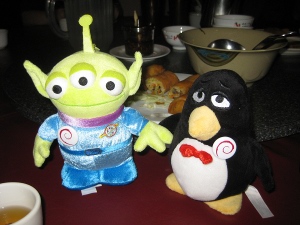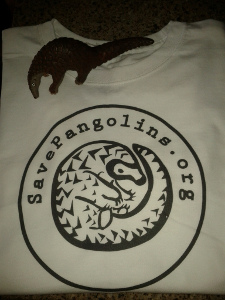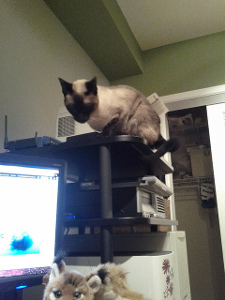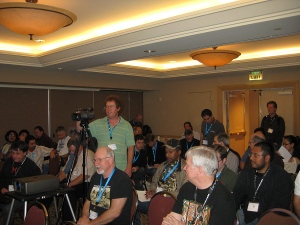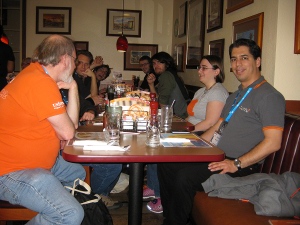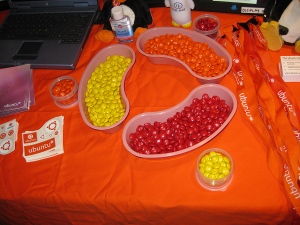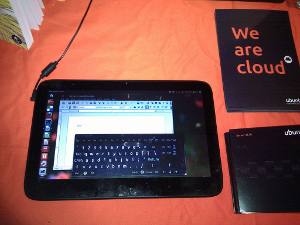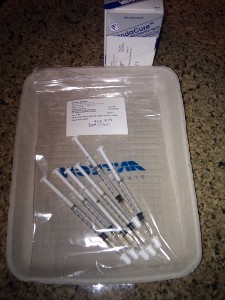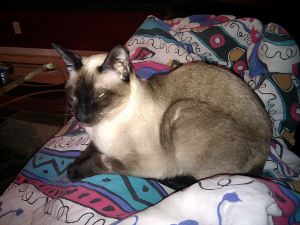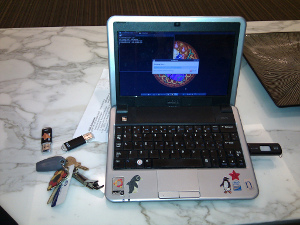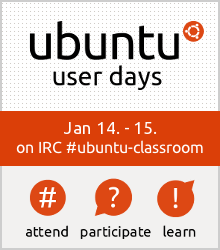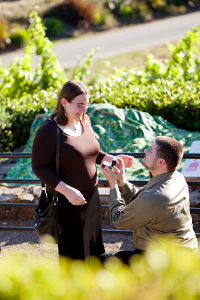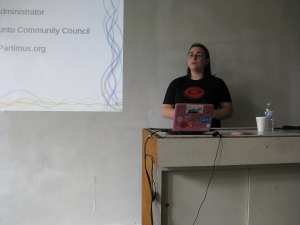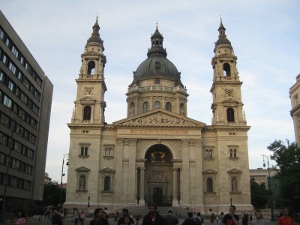I spent last weekend at the the Southern California Linux Expo. I flew down to Los Angeles Thursday evening.
Friday morning I gave my Ubucon talk on Getting Involved with Ubuntu. To accompany this talk I had handouts that gave a bunch of URLs to resources within the project that I covered in the talk. I particularly enjoyed the Q&A where people took the opportunity to ask specific questions about areas they were interested in getting involved with and I ended up having several follow-up discussions with folks. I’ve uploaded the materials for my talk: slides, handout.
Next on the Ubucon schedule was “Audience Introductions and Lightning Talks” which, with such a big crowd, ended up being long introductions with stories woven in. It’s always inspiring to learn all the things people are working on in F/OSS that aren’t well-publicized, and the session was great for figuring out who you should have a chat with later.
Next up was Ralf Pieper’s Meet the Cloud session. He didn’t really cover the rapidly evolving ecosystem that is the Ubuntu cloud community today. Instead his talk was more general, giving an overview of what “cloud” is and information about the open source resources available, as well as covering proprietary SaaS, PaaS and others provided by companies like Google and Sales Force.
After lunch was Jorge Castro’s The Power User’s Guide to Unity. Most people know through my involvement with Xubuntu that I’m not a Unity user and I’ve only ever really used Gnome in passing. However, I found myself quite interested throughout this talk! He didn’t cover customization, but instead his whole talk was demonstrating some of the key features of Unity that increase productivity but people may not know about. He based much of his talk on a post he made of the same name The Power User’s Guide to Unity in which he collects resources from questions and answers on askubuntu.com.
Ubucon audience
From there I departed from Ubucon to head over to the juju Charm School. Over the past few years there has been an explosion of configuration management, quick deployment and other systems administrator tools to make the lives of us sysadmins easier when it comes to rapid deployment. Puppet is the only one I’ve explored recently with any depth, and even that we’re not yet using in production at work. The juju toolset is more of a quick deployment and service relationship management tool, although configuration can be included or used in collaboration with an existing system like Puppet. I had seen juju demos floating around the online Ubuntu community previously, but this charm school was a good opportunity to hear from fellow sysadmins about what they thought of the tools. It was an interesting session and the presentation finished with handing out juju t-shirts to attendees, including ones in women’s sizes. Now, I was the only woman in the room of 30+ people and a joke was made that the box of women’s t-shirts was brought just for me, but I went out of my way to thank them for the consideration. It really, really meant a lot (read more about why here).
I then went to Richard Gaskin’s Customizing Unity talk. It was another very demonstration-oriented talk where he explored the Unity Plugin section of the CompizConfig Settings Manager. He’s a really great speaker who had the audience laughing at several points, particularly when he kept impressing upon us that “I didn’t tell you to do this, it’ll probably break your system” with every change he made.
Congrats to Nathan Haines and the rest of the volunteers at Ubucon for making it another great event this year. There were a few sessions throughout the day that had standing room only!
Friday evening 11 of us ended up going out with an Ubuntu California (and friends!) dinner at a nearby diner.
Ubuntu California dinner
Saturday morning I was up bright and early to start putting together the Ubuntu booth on the expo floor.
The booth really came together nicely, the banner and tablecloth from Canonical make a huge difference in how things look. And Eric P. Scott had the clever idea of M&Ms put into dishes that make the Ubuntu logo:
The candy was quite the hit at the booth
Once the booth was set up I ran off to give my second talk of the conference, Bringing Linux into Public Schools and Community Centers. Unfortunately it was at the same time as the keynote on Saturday and in a room that wasn’t on the map because it was on a different floor than the rest of the talks, but I did manage to have a great audience of 40-50 people. In this talk I gave examples from a deployment at a community center that Ubuntu Pennsylvania worked on in 2007 and a couple of the public charter schools Partimus.org works with. From there I expanded upon several of the lessons we’ve learned as an outside organization getting involved in learning centers and charter schools. I knew there were educators and tech professionals in my audience who had worked on deployments like ones I’ve worked on, so I actively encouraged audience participation throughout my talk, and I’m very glad I did. The audience participation was spectacular, drawing from different types of deployments, I even was able to divert answering of some of the questions to some audience members who had more experience than I do in certain areas. I also ended up having several discussions after my talk and throughout the weekend with others interested in schools and was able to swap contact info with people from organizations similar to Partimus. I’ve uploaded the materials for my talk: slides, notes.
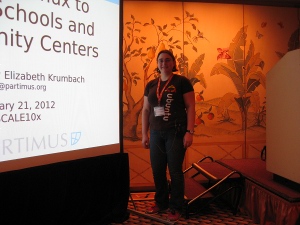
Thanks to Richard Gaskin for taking pictures during my talk
I spent much of the weekend at the Ubuntu booth, the EXOPC Slate running Ubuntu that Akkana Peck brought to demonstrate Ubuntu on a tablet ended up being quite a popular demonstration.
Huge thanks to all our Ubuntu California booth volunteers: Jess Bermudes, Mickey Lyle, Philip Ballew, Eric P. Scott, Nathan Haines and Jack Deslippe. Also thanks to Eric Hammond and David Wonderly who brought along a bunch of materials that were vital for the booth. It was a great couple of days, gave out over 400 Ubuntu CDs (thanks to Canonical for shipping us the a conference pack and pressed CDs for the conference!).
As for other talks at the conference, I ended up going to one about the current state of OpenStack by Jesse Andrews (might load up the DevStack version that is easily installable on Ubuntu 11.10). I tried to go to Alison Chaiken’s Automotive: the Next Frontier for Mobile Linux but by the time I wrapped things up at the booth for the evening the room she was presenting in was already spilling over into the hallway. Sunday I went the Selena Deckelmann’s great keynote about how to “plan for the worst, minimize risk and recover gracefully from failure” before heading to a quick little Ubuntu Women meetup. I also went to Cat Allman’s Fundraising 101 (or “Free as in Freedom So Who Pays for the Beer?”) talk, where I picked up some great tips for handling money for non-profits. After packing up the Ubuntu booth I wrapped up my weekend at SCALE by going to the Ceph distributed storage system talk by Sage Weil, Ceph is very cool stuff.
In all? Awesome weekend! Kudos to the SCALE folks for pulling off another amazing conference!
More photos from Ubucon and SCALE here: http://www.flickr.com/photos/pleia2/sets/72157629015857079/




